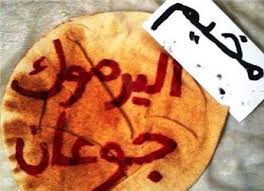 The United Nations human rights chief today strongly condemned the repeated obstruction of aid convoys trying to bring supplies to a besieged Palestinian refugee camp in Syria, stating that impeding humanitarian assistance to desperate civilians may amount to a war crime.
The United Nations human rights chief today strongly condemned the repeated obstruction of aid convoys trying to bring supplies to a besieged Palestinian refugee camp in Syria, stating that impeding humanitarian assistance to desperate civilians may amount to a war crime.
More than 160,000 Palestinian refugees lived in Yarmouk, a suburb just south of Damascus, until December 2012, when the vast majority fled after armed opposition groups entered the camp and Government forces attacked.
The UN Relief and Works Agency for Palestine Refugees (UNRWA) has been unable to deliver any assistance since September last year, with the exception of polio vaccines in December, to the camp, where some 18,000 people remain. An attempt to deliver aid just this week was thwarted when a UN convoy was prevented from entering Yarmouk.
“Over the past four months numerous attempts by the UN and other organizations to bring convoys of food and medical aid to malnourished children, women and elderly people close to starvation in Yarmouk, have been thwarted, and very little aid was getting through during the nine months prior to that,” said UN High Commissioner for Human Rights Navi Pillay.
“Civilians, including many women and children, are caught in a quagmire between besieging Syrian Government forces and affiliated militias surrounding the Yarmouk camp, as well as anti-Government armed groups operating inside,” she stated.
A news release issued by the High Commissioner’s office (OHCHR) said there have been reports of a number of deaths from starvation, as well as from the consumption of rotten food, and because of the chronic shortage of medical supplies and expertise for sick and injured people and pregnant women trapped in the camp.
The situation is compounded by the lack of electricity and severe shortage of water. Civilians also continue to be killed by ongoing fighting and sporadic aerial attacks.
“The extent of malnutrition, and the numbers who have died directly or indirectly because of it, are not known for sure,” Ms. Pillay said. “But it is crystal clear that the situation in Yarmouk is now extremely desperate, and that civilians are dying as a result. Government forces and affiliated militias appear to be imposing collective punishment on the civilians in Yarmouk.”
Ms. Pillay pointed out that international law requires the parties to the conflict to permit free passage of all consignments of essential foodstuffs and clothing intended for children under 15, expectant mothers and maternity cases and to allow the free passage of all consignments of medical and hospital supplies.
“Intentionally directing attacks against personnel, installations, material, units or vehicles involved in a humanitarian assistance is a war crime under the Rome Statute of the International Criminal Court,” she said.
“Customary international law also requires parties to a conflict to avoid locating military objectives within or near densely populated areas,” she added.
“All parties to the conflict must urgently facilitate unimpeded access to humanitarian relief to the civilians trapped in Yarmouk, before more children die,” the High Commissioner stressed. “In addition, immediate action needs to be taken to ensure safe passage for all those civilians wishing to leave.”
The two main routes for humanitarian relief to enter into the Yarmouk camp can only be reached through a succession of checkpoints that strictly control entry and exit, preventing residents from accessing basic necessities, including food and medicine.
Ms. Pillay highlighted that starvation of civilians as a method of combat is prohibited under international law and may amount to a war crime.
She stressed that objects indispensable to the survival of the civilian population, such as foodstuffs, agricultural areas for the production of foodstuffs, crops, livestock, drinking water installations and supplies and irrigation works, are protected under international law. Attacking, destroying, removing or rendering useless such objects are prohibited.
UN

Leave a Reply
You must be logged in to post a comment.